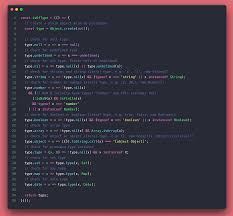Unlocking the Potential: Harnessing the Power of JavaScript Code
The Power of JavaScript Code: Transforming the Web
JavaScript is a versatile and powerful programming language that plays a crucial role in shaping the modern web. From interactive websites to dynamic web applications, JavaScript code empowers developers to create engaging and responsive user experiences.
One of the key strengths of JavaScript lies in its ability to manipulate HTML elements on a webpage. By using JavaScript code, developers can dynamically update content, handle user interactions, and create animations that enhance the overall user experience.
Furthermore, JavaScript is supported by all major web browsers, making it a universal language for web development. This widespread compatibility ensures that JavaScript code can reach a broad audience without any compatibility issues.
Another advantage of JavaScript is its flexibility and scalability. Developers can use JavaScript frameworks and libraries such as React, Angular, or Vue.js to streamline development processes and build complex web applications more efficiently.
Moreover, with the rise of server-side JavaScript platforms like Node.js, developers can now use JavaScript code for both client-side and server-side programming. This full-stack capability allows for seamless integration between frontend and backend systems, resulting in faster and more responsive web applications.
In conclusion, JavaScript code is a powerful tool that continues to drive innovation in web development. Its versatility, compatibility, and scalability make it an essential language for creating dynamic and interactive web experiences. As technology evolves, JavaScript will undoubtedly remain at the forefront of shaping the future of the web.
6 Essential Tips for Writing Clean and Effective JavaScript Code
- Always use descriptive variable and function names to improve code readability.
- Follow consistent coding conventions, such as indentation and naming conventions, to maintain code consistency.
- Use comments to explain complex logic or functionality that may not be immediately clear from the code.
- Avoid global variables whenever possible to prevent variable conflicts and maintain a clean scope.
- Regularly test your code and use debugging tools to identify and fix errors early in the development process.
- Keep up-to-date with best practices and new features in JavaScript to enhance your coding skills.
Always use descriptive variable and function names to improve code readability.
When writing JavaScript code, it is essential to always use descriptive variable and function names to enhance code readability. By choosing meaningful and clear names for variables and functions, developers can easily understand the purpose and functionality of each component within the codebase. This practice not only improves the readability of the code but also makes it more maintainable and easier to debug in the future. Clear and descriptive naming conventions help streamline collaboration among team members and ensure that the code remains comprehensible for both current and future developers working on the project.
Follow consistent coding conventions, such as indentation and naming conventions, to maintain code consistency.
Following consistent coding conventions, such as maintaining proper indentation and adhering to naming conventions, is essential for ensuring code consistency in JavaScript development. Consistent coding practices not only make the code more readable and understandable but also facilitate collaboration among developers working on the same project. By following established conventions, developers can create code that is easier to maintain, debug, and scale. Consistency in coding conventions ultimately leads to improved code quality and efficiency in the development process.
Use comments to explain complex logic or functionality that may not be immediately clear from the code.
Using comments in JavaScript code to explain complex logic or functionality is a best practice that can greatly enhance code readability and maintainability. By providing clear explanations within the code, developers can help themselves and others understand the purpose and reasoning behind intricate algorithms or processes. Comments serve as valuable documentation that can guide future modifications or troubleshooting efforts, ensuring that even complex code remains accessible and comprehensible to all stakeholders involved in the project.
Avoid global variables whenever possible to prevent variable conflicts and maintain a clean scope.
When writing JavaScript code, it is advisable to avoid using global variables as much as possible. Global variables can lead to variable conflicts and make it challenging to maintain a clean scope within your code. By minimizing the use of global variables and instead opting for local variables within functions or modules, developers can reduce the risk of unintended side effects and improve code readability. This practice helps ensure that each variable is contained within its intended scope, promoting better organization and easier debugging in the long run.
Regularly test your code and use debugging tools to identify and fix errors early in the development process.
Regularly testing your JavaScript code and utilizing debugging tools are essential practices to ensure the quality and reliability of your web applications. By conducting thorough testing and actively debugging your code, you can identify and address errors at an early stage of the development process, preventing potential issues from escalating into more significant problems. This proactive approach not only helps in maintaining the functionality of your code but also enhances the overall user experience by delivering a seamless and error-free application.
Keep up-to-date with best practices and new features in JavaScript to enhance your coding skills.
Staying current with best practices and new features in JavaScript is essential for enhancing your coding skills. By keeping up-to-date with the latest trends and techniques in JavaScript development, you can improve the efficiency and quality of your code. Embracing new features allows you to leverage the full potential of the language, leading to more innovative and robust solutions. Continuous learning and adaptation to industry standards ensure that your JavaScript code remains relevant and competitive in an ever-evolving technological landscape.





